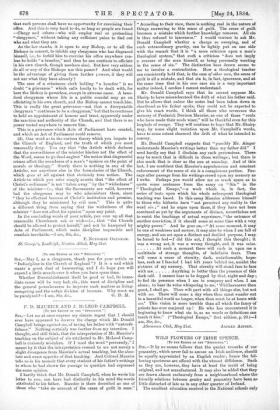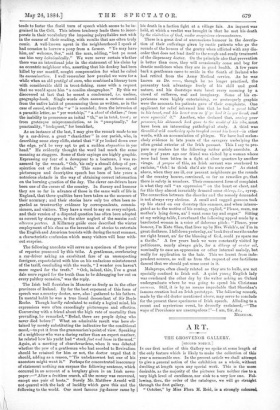WILD FLOWERS OF IRISH SPEECH.
[To ma EDITOR OF THE "SpEcnrou.-1
SIR,—It by no means follows that the quaint remarks of our peasantry, which never fail to amuse an Irish audience, should- be equally appreciated by an English reader ; hence the fol- lowing specimens are offered with the utmost diffidence. Such. as they are, however, they have at least the merit of being original, and not manufactured. It may also be added that they are drawn almost exclusively from a neighbourhood where the- friendly relations between gentry and peasantry have been as little disturbed of late as in any other quarter of Ireland.
The excellent education received in the National schools only tends to foster the florid turn of speech which seems to be in- grained in the Celt. This inborn tendency leads them to incor- porate in their vocabulary the imposing polysyllables met with in the course of their reading, with results that are often truly comic. A well-known agent in the neighbourhood I speak of had occasion to borrow a pony from a farmer. " Ye may have him, an' welcome, Sor," said the man, adding, "but ye must use him very ec6n6mecally." We were never certain whether there was an intentional joke in the statement of his claim by an eccentric neighbour who, asserting that his donkey had been killed by our mastiff, sought compensation for what he called its assassination. I well remember how puzzled we were for a while when an old protégé of ours, who combined a literary turn with considerable skill in trout-fishing, came with a request that we would spare him " a condim ahsographee." By this we discovered at last that he meant a condemned, i.e. useless, geography-book. Single words often assume a curious sound from the native habit of pronouncing them as written, as in the case of sword, where the " w " is sounded ; from the intrusion of a parasitic letter, as "yer wortship," " a shoot of clothes ;" from the inability to pronounce an initial " th," as in tatch, troat ; or from grotesque mispronunciation, as in " pnmptually," for punctuality, " brekquest," for breakfast, As an instance of the last, I may give the remark made to me by a car-driver, a great " characther " in our parish, who, in describing some steep cliffs, stated that " if ye looked down over the edge, ye'd be very apt to get a sudden stagnation in yer head." He evidently thought the word had much the same meaning as staggers. Some of their sayings are highly graphic. Expressing my fear of a downpour to a boatman, I was re- assured by the remark. " Och, 'tis only a shmall drhop of per- spiration out of the clouds." This same gift, however, of picturesque and descriptive speech has been of late years a notorious obstacle in the way of obtaining correct information on the burning question of the day. The clever car-drivers have been one of the curses of the country. In fluency and humour they are so far in advance of those in the same walk of life in England, that these qualities have been taken as the measure of their accuracy ; and their stories have only too often been re- garded as trustworthy evidence by correspondents, commis- sioners, and visitors. They have a word to say on every subject, and their version of a disputed question has often been adopted as correct by strangers, to the utter neglect of the maxim audi alter= parterre. A Killarney guide once described the winter employment of his class as the invention of stories to entertain the English and American tourists with during the next summer, a characteristic confession which many visitors will hear with- out surprise.
The following anecdote will serve as a specimen of the power of repartee possessed by this tribe. A gentleman, overhearing a car-driver asking an exorbitant fare of an unsuspecting foreigner, expostulated with him on his audacious misstatement of the tariff, concluding with the words, " I wonder you haven't more regard for the truth." " Och, indeed, thin, I've a great dale more regard for the truth than to be dthragging her out on every palthry occasion," was the reply.
The Irish hull flourishes in Munster as freely as in the other provinces of Ireland. By far the best exponent of this form of speech was a country doctor, now, alas ! gathered to his fathers. In mental habit he was a true lineal descendant of Sir Boyle Roche. Though hardly calculated to satisfy a logical mind, his expressions were often exceedingly picturesque and effective. Conversing with a friend about the high rate of mortality then prevailing, be remarked, " Bedad, there are people dying who never died before !" What an admirable result was here ob- tained by merely substituting the indicative for the conditional mood,—to put it from the grammarian's point of view. Speaking of a neighbour who was a daring rather than an expert mariner, he related how his yacht had " stuck fast and loose in the mud." Again, at a meeting of churchwardens, when it was debated whether the pew of a gentleman who had seceded to Revivalism should be retained for him or not, the doctor urged that it should, adding as a reason, "'Tis unbeknownst but one of his ancestors might want it." Perhaps for concentrated inaccuracy of statement nothing can surpass the following sentence, which occurred in an account of a burglary given in an Irish news- paper :—" After a fruitless search, all the money was recovered, except one pair of boots." Surely Mr. Matthew Arnold will IN our first notice of this Gallery we spoke at some length of the only feature which is likely to make the collection of this year a memorable one. In the present article we shall attempt to give a general notion of the exhibition as a whole, without dwelling at length upon any special work. This is the more desirable, as the majority of the pictures here neither rise to a very high level of excellence, nor sink to a very low one. Fol- lowing, then, the order of the catalogue, we will go straight not quarrel with the lack of lucidity which gave this and thethrough the first gallery.
I
following to the world. Our most famous jig-dancer came by " October," by Miss Flora M. Reid, is a strongly coloured.
his death in a faction fight at a village fair. An inquest was held, at which a verdict was brought in that he met his death by the visitation of God, under suspicious circumstances.
There is a great deal of unconscious humour in the descrip- tion of their sufferings given by rustic patients who go the rounds of the houses of the gentry when afflicted with any dis- order that does not lend itself to the rough-and-ready treatment of the dispensary doctor. On the principle also that prevention is better than cure, they will occasionally come and beg for drastic medicines when they are in good health. A few years back a gentleman came to reside in the South of Ireland who had retired from the Army Medical service. As he was known as Dr. —, though he no longer practised, the peasantry took advantage freely of his skill and good nature, and his doorsteps were beset every morning by a crowd of sufferers, real and imaginary. Some of his ex- periences were highly entertaining, so grotesquely graphic were the accounts his patients gave of their complaints. One applicant for relief informed him that he had a great in his Croat, and his heart was as if ye had it in yer hand, and were squeezin' it." Another, who declared that, saving your presence, his shlomach had gone to the wesht of his ribs, must have been an interesting pathologiml study. A third was throubled wid conthrary spits tangled round his heart—in other words, with an accumulation of phlegm. We have had melan- choly evidence in late years of the savagery underlying the often genial exterior of the Irish peasant. This I say to pre- pare my readers for the following rather grisly anecdote. A couple of years ago our friend was visited by a woman whose nose had been bitten in a fight at close quarters by another virago. A propos of this, an Irish servant was overheard to exclaim, " Och ! to think she'd ate the mate raw !" As stated above, when they are ill, our peasant neighbours go the rounds of the country houses, convinced, so far as remedies go, that there is safety in numbers. Their commonest form of complaint is what they call " an oppression " on the heart or chest, and for this they almost invariably demand some chimp, i.e., syrup. The connection between the disorder and the remedy demanded is not always very obvious. A small and ragged gossoon took up his stand on our doorstep this summer, and when interro- gated as to the motive of his coming, replied, "Please, mam, me mother's lying down, an' I want some tay and sugar." Sitting at my writing-table, I overheard the following appeal made by a barefooted woman in a voice of dolorous pitch : " Please, your honour, I'm Kate Shea, that lives np by Mrs. Welch's, an' I'm in great disthress. I fell down yesterday, an' bruk five of me ribs under me right breast, an' for the blessing of Gcd, could ye spare me a thrifle.'' A few years back we were constantly visited by petitioners, nearly always girls, for a dihrop of castor oil, nominally to ease an oppression or other internal malady, but really for application to the hair. This we learnt from inde- pendent sources, as well as from the request of one fastidious damsel that we should put some scent in it.
Malaprops, often closely related as they are to bulls, are not specially confined to Irish soil. A quiet young English lady was overheard the other day by the writer asking an Oxford undergraduate where he was going to spend his Christmas vacuum. Still, it is by no means improbable that Sheridan's famous creation had an Irish prototype. The following remark, made by the old doctor mentioned above, may serve to conclude for the present these specimens of Irish speech. Alluding to a recent and mysterious event, he devoutly exclaimed,—" The ways of Providence are unscrupulous !"—I am, Sir, &c.,
Mrusran.

































 Previous page
Previous page